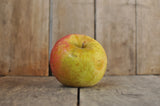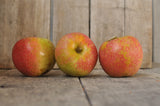Esopus Spitzenburg
Esopus Spitzenburg originated in Esopus, Ulster County, New York, in the latter part of the 18th century. It was one of Thomas Jefferson's favorite apples. He ordered 12 trees from William Prince's Flushing, Long Island, Nursery in 1790 to plant at Monticello. A likely parent of the Jonathan and is classified in the Baldwin group. A large apple, oblong in shape, smooth-skinned and colored a brilliant red, approaching scarlet, and covered with small yellow specks. In hot and humid regions, the color is not as pronounced. The yellow flesh is rich, juicy, and sprightly, and ranks high in taste tests. A shy bearer on slender, willowy limbs, this biennial bearer needs a pollinator. The upright growing tree is moderate in vigor with olive-colored bark, and dull leaves, folded with irregular shallow serrations. The branches have wide crotch angles and are long and drooping. Susceptible to fireblight, and can develop a condition called Jonathan Spot if left on the tree too long. Scab, canker and collar rot are also problems of this classic dessert fruit. Ripens late September and early October.




